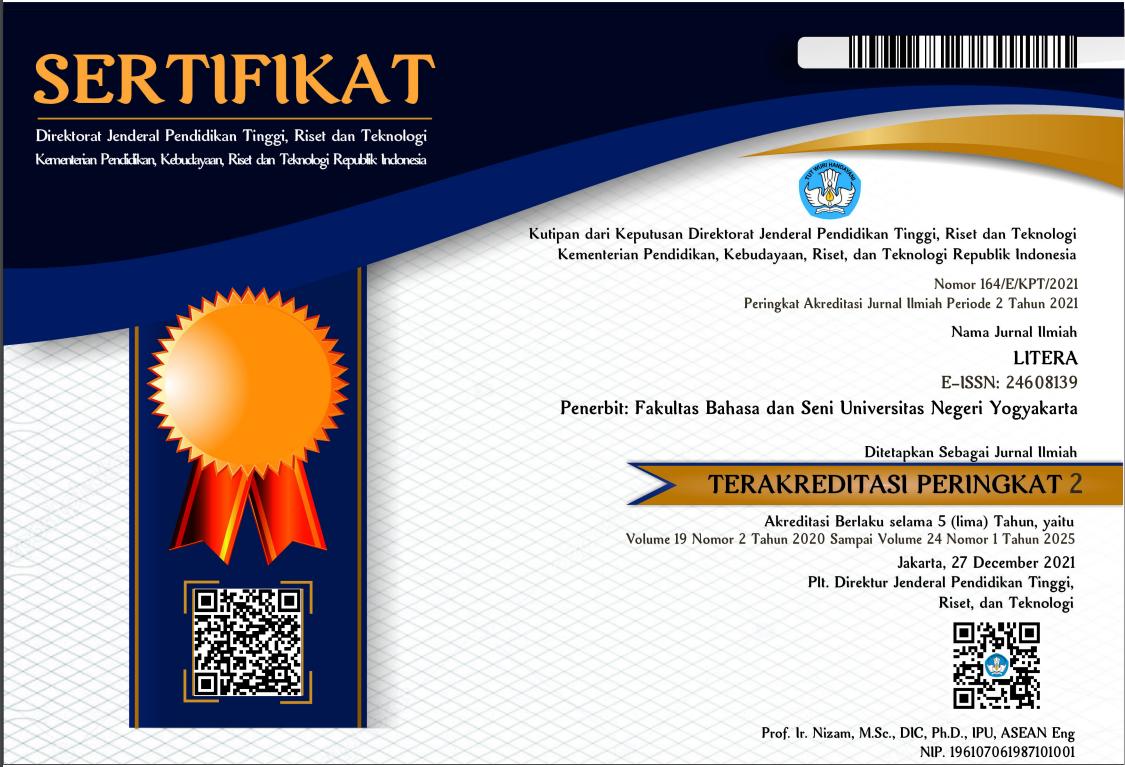The exploration of students and teachers' view on ecological storybooks
Downloads
Environmental issues are on-going crises that have yet found sufficient solutions. Children, as the next generation, must be given the trust to be able to get in touch with environmental issues as form of children's empowerment and preservation act. This study aims to describe the views of elementary school students and teachers related to children's ecology-themed storybooks. This research is qualitative, the data collection uses a list and guided interview questions, observation sheets, questionnaire sheets, and expert validation sheets. The results of the study are as follows. First, there is a lack of ecological books in major bookstore in Yogyakarta, Indonesia. The existing children books containing environmental theme only included it as a supporting theme. This may result in most children participant to be not interested in such books. Second, teachers are mostly in agreement as to how children ecological storybook should appear ideally. This includes realism as the story's genre, explicit theme, forest settings, picture book form, human characters & nature vs human conflict, and happy closed ending for the story. All of these are believed to be able to educate children on the on-going environmental crisis and to encourage the children to face them.
Keywords: children's storybooks, ecology, children's empowerment, environment, children's literature
Downloads
Cairney, T. (2010). "Key Themes in Children's Literature: Environmental Issues." Literacy, families and learning. https://trevorcairney.blogspot.com/2010/03/key-themes-in-childrens-literature.html
Ceballos, G., Ehrlich, P. R., Dirzo, R. (2017). Biological annihilation via the ongoing sixth mass extinction signaled by vertebrate population losses and declines. Proceedings of the National Academy of Sciences (PNAS). www.pnas.org/cgi/doi/10.1073/pnas.1704949114
Dewi, N. Ekokritik dalam Sastra Indonesia: Kajian Sastra yang Memihak. Adabiyyat, XV (1), 19-37.
Estok, S. C. (2001). "A Report Card on Ecocriticism." AUMLA: The Journal of the Australasian Universities Language and Literature Association. Vol. 96 (Nov. 2001): 220-38.
Guler, T. (2010). Environmental Education. B. Akman, G. Balat ve T. Guler (Eds.) Science Education in the Preschool Period. (pp. 181-201). Ankara: PEGEM Publishing Inc.
Koran Sindo. 4 Mei 2018 – 06.00 WIB. "Survei Litbang Koran Sindo: 10 Problem Besar Lingkungan di Indonesia." From https://nasional.sindonews.com/read /1302781/15/10-problem-besar-lingkungan-di-indonesia-1525347778
Kurnia, N. I., & Hasni, L. I. (2016). Increasing Children's Ecological Awareness Through Children's Literature Menggagas Pembelajaran Sastra Hijau. Yogyakarta: Interlude.
Martin, L., J. (2016). Themes in Children's Fiction. from http://literature4kids.com/themes-childrens-fiction/
Nurgiyantoro, B. (2019). Sastra Anak: Pengantar Pemahaman Dunia Anak. Yogyakarta: Gadjah Mada University Press.
Ahmad, M. (2010). Pendidikan Lingkungan Hidup dan Masa Depan Ekologi Manusia. Forum Tarbiyah. 8 (1).
Efendi, A. and Rahma, L. (2019). Literary learning for Teenager inmates in Institute for Children Special Rehabilitation. Cakrawala Pendidikan, 38 (3), 411-425, from doi:10.21831/cp.v38i3.27322.
Rinkesh. (2020). 20 Current Environmental Problems That Our World is Facing - Conserve Energy Future. Conserve Energy Future. https://www.conserve-energy-future.com/15-current-environmental-problems.php
Siswanto., Karimullah., Prasetyawati, R., & Nurhayati. Environmental Cultured Education and its Implication on the Student's Competencies in an Adiwiyata School. Cakrawala Pendidikan. 38 (3), 552-564, from doi:10.21831/cp.v38i3.23154.
Strife, S. J. (2012). Children's Environmental Concerns: Expressing Ecophobia. The Journal of Environmental Education, 43(1), 37 - 54. presented at the 2012/01/01/. Retrieved from http://dx.doi.org/10.1080/00958964.2011.602131
























